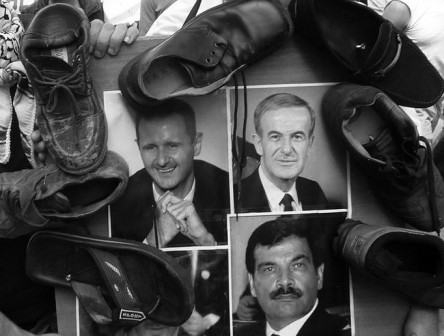Syria-Israel Business Talks
NEWS JUNKIE POST
May 21, 2011 at 9:48 pmBy Anthony Zeitouni
In his Mideast remarks “A Moment of Opportunity” President Obama addresses the Syrian popular upraising and sends a clear message to President Bashar al-Assad to either lead a transition to democracy or “get out of the way”. It looks like the Syrian regime has not yet received Obama’s “Either-Or” message, because it has been busy sending an “If-Then” message to Washington through threats to Israel.
The Syrian rhetoric regarding Israel has never been as clear as it has been this past week. It contains neither ideological language nor endless speeches in the style of the Baath. It is simply one “if-then” statement: “If there is no stability here (in Syria), then there’s no way there will be stability in Israel.” This statement was made in Damascus to the New York Times by Rami Makhlouf, the first cousin and best friend of President Bashar al-Assad. If any other Syrian senior official had said that, the words will not carry the weight that Makhlouf’s statement does because he is the regime’s spoiled businessman.
At 41 he is a billionaire who, among his many holding companies, owns Syriatel, Syria’s mobile telephone provider. In Syria they say: Bashar may be the leader, but Rami is the owner of Syria. Mr. Makhlouf is the Syrian version of Ahmed Ezz of Egypt or Leila Traboulsi bin Ali of Tunisia. Recently both the US and the EU imposed sanctions on Rami Makhlouf over protests in Syria.
 Mr. Makhlouf did not say anything about Golan Heights or negotiations. He speaks strictly of business: stability in Syria equals stability in Israel. Furthermore, he added, “Nothing and no one can guarantee what will happen after, God forbid, anything happens to this regime.”
Mr. Makhlouf did not say anything about Golan Heights or negotiations. He speaks strictly of business: stability in Syria equals stability in Israel. Furthermore, he added, “Nothing and no one can guarantee what will happen after, God forbid, anything happens to this regime.”
The on-the- ground translation of Makhlouf’s statement arrived in the Golan Heights and in South Lebanon on the 63rd anniversary of the establishment of Israel, known in the Arab countries as Al-Nakba – The Day of Catastrophe – or the 1948 Palestinian exodus. This year marked a precedent when approximately 2500 Palestinian refugees in Syria crossed the borders toward Israel in the northern area of the Golan Heights. This was the first time since 1974 (when Syria and Israel signed the Separation of Forces Agreement) that the Syrian authorities allowed the Palestinian refugees to reach that four-decade-long calm border with Israel. A similar situation happened in south Lebanon when Syrian-backed Hezbollah allowed around 1500 Palestinian refugees to reach the Lebanese border with Israel. It is well known that Hezbollah does not allow Palestinians to reach, let alone demonstrate in, south Lebanon especially in the border areas that it monopolizes.
Clearly the Syrian regime is trying to change the rules of game with Israel. If Israel and Washington continue to ignore the unrest in Syria, this is the clear message from Rami Makhlouf: “What I’m saying is, don’t let us suffer, don’t put a lot of pressure on the president, don’t push Syria to do anything it is not happy to do.” This will lead not to an all-out war but rather a continued unrest on the Israeli borders with Syria and Lebanon which exhaust Israel the most. Makhlouf confirms that he “didn’t say war.”
In the third month of continued unrest in Syria, Bashar al-Assad reveals his strategy and sends a clear message to Obama and to Israel. The message states that they have to act to ease the situation in Syria. Otherwise, the May 15 demonstrations will be a model gift to Israel; June 5th could be the next encounter.
 Given Mubarak’s example, I don’t believe that Obama and Israel can do much to help al-Assad’s regime survive this crisis, especially after he has gone so far as choosing “the path of murder and the mass arrests of its citizens” as Obama said on his Mideast remarks. However al-Assad continues to misunderstand the situation as he tries to push for a regional solution to his internal crisis. Unfortunately, the terms “stability” and “democracy in Syria” are mutually exclusive in the mindset of Al-Asaad’s regime.
Given Mubarak’s example, I don’t believe that Obama and Israel can do much to help al-Assad’s regime survive this crisis, especially after he has gone so far as choosing “the path of murder and the mass arrests of its citizens” as Obama said on his Mideast remarks. However al-Assad continues to misunderstand the situation as he tries to push for a regional solution to his internal crisis. Unfortunately, the terms “stability” and “democracy in Syria” are mutually exclusive in the mindset of Al-Asaad’s regime.
President al-Assad had a great opportunity before him. First he should immediately “permit peaceful protests, release political prisoners and stop unjust arrests…” not because Obama asked him to do so, but to show respect to the citizens of Syria and to his oath to protect his country and its people. This would add value to his nullification of the four-decade-long law of emergency rule. Then he can face his people and start to establish a national dialogue leading to a new social and political contract to build a real democracy in Syria. If he does this, he will be the big winner. Al-Assad is still in a position to take initiatives as the internal pillars of his regime have not collapsed as have so many other Arab governments. Does he think that this opportunity will last forever?
Editor’s Note: Anthony Zeitouni (anthonygaz@gmail.com ) is a Washington-based analyst, working in conflict resolution. He focuses on reform, good governance, human rights, minorities and interfaith dialogue in the Middle East. Zeitouni has published in Search for Common Ground and with Middle East Times. He was born in Beirut, Lebanon. His web site is www.anthonyzeitouni.com
Related Articles
- July 14, 2011 Syria: Who Is In Charge, Bashar Al-Assad or Maher Al-Assad?
- November 20, 2012 G. Mercier on RT: Israel Attack on Gaza Is Worse Than a Crime, It’s a Blunder
- January 31, 2011 Toppling Of Mubarak: A Chance For Peace In The Middle East
- October 17, 2010 Middle East: The Clash Of The Fundamentalists
- June 12, 2011 The Question Of Syria
- December 23, 2011 Are Islamist Fundamentalists Hijacking The Arab Revolution?













4 Responses to Syria-Israel Business Talks
You must be logged in to post a comment Login